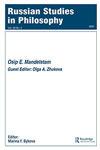作为认知范畴的“哲学蒸汽”与历史集体个性
IF 0.1
4区 哲学
Q4 Arts and Humanities
引用次数: 0
摘要
摘要本文论述了“哲学汽船”概念内容的发展,该概念指的是1922年一群尖锐批评当局的知识分子被驱逐出俄罗斯。作者表明,流亡哲学家群体既有其先前的哲学和社会活动,也有其作为移民的共同活动。她分析了Lev P.Karsavin提出的“历史集体个性”、“集体人”和“共同人”的概念,以确定这个流亡社会群体的整体性质及其特有的自我意识、行为、愿望和情感(情绪)。通过以上列出的概念来审视被称为“哲学蒸汽机”的事件,可以让作者更广泛、更富有成效地认识历史、社会和文化现实。文章表明,集体人的概念也可以应用于其他社会群体,从而将人类研究认知的方法论扩展到对事实和统计数据的研究之外。本文章由计算机程序翻译,如有差异,请以英文原文为准。
The “Philosophy Steamer” as Cognitive Category and Historical Collective Individuality
ABSTRACT This article discusses development of the content of the concept “Philosophy Steamer,” which refers to the 1922 expulsion from Russia of a group of intelligentsia who sharply criticized the authorities. The author shows that the group of exiled philosophers was united both by their previous philosophical and social activity and by their joint activity as émigrés. She analyzes the concepts of “historical collective individuality,” “collective person,” and “communal person” introduced by Lev P. Karsavin in order to determine the holistic nature of this exiled social group and its characteristic self-consciousness, behavior, aspirations, and feelings (moods). Examining the event known as the “Philosophy Steamer” through the concepts listed above allows the author to cognize the historical, social, and cultural reality more broadly and productively. The article demonstrates that the concept of a collective person can also be applied to other social groups, thereby extending the methodology of human-studies cognition beyond the study of facts and statistical data.
求助全文
通过发布文献求助,成功后即可免费获取论文全文。
去求助
来源期刊

RUSSIAN STUDIES IN PHILOSOPHY
PHILOSOPHY-
CiteScore
0.10
自引率
0.00%
发文量
14
期刊介绍:
Russian Studies in Philosophy publishes thematic issues featuring selected scholarly papers from conferences and joint research projects as well as from the leading Russian-language journals in philosophy. Thematic coverage ranges over significant theoretical topics as well as topics in the history of philosophy, both European and Russian, including issues focused on institutions, schools, and figures such as Bakhtin, Fedorov, Leontev, Losev, Rozanov, Solovev, and Zinovev.
 求助内容:
求助内容: 应助结果提醒方式:
应助结果提醒方式:


